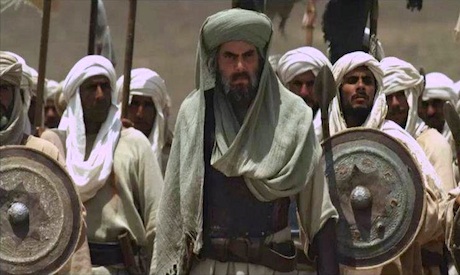-
Faisal Al AmeiryGhanem Zarly...
-
Drama
-
Out now
-
Hatem Ali
Yasmin Shehab

The
show comes with a fair bit of baggage; it’s the first time that the Prophet’s
closest companions have ever been portrayed by actors and with all the fatwas
being released condemning the production, it has to work doubly hard not to
alienate any viewers who are possibly swayed by these statements. And while we
feel it’s time Islamic history came out of books and was made more dynamic and
frankly, interesting, the show is downright conservative in every other aspect.
True
to the title, the show focuses on Omar Ibn El Khattab, the Prophet’s companion
and second caliphate, beginning from his time as a shepherd before the
revelation. Known for his toughness, jealousy and ferocity as much as his
justness, the character carries less of the former traits while focuses on the
latter; it is a very bland version of a famously colourful man, one designed to
almost deify Omar instead of presenting him as a naturally flawed human being whose
achievements made him immortal. Adding to it is the inexperience of Ismail, who portrays Omar by giving him
precisely two expressions; serious, his default mode, and a slow blink which
denotes any kind of emotion. He also lacks charisma unlike the image of Omar
that’s been passed down to us over the ages. What should have been a
definitive, career making role, will probably end up as a footnote in the history
of religious dramas.
The
rest of the cast, who hail from all over the Middle East and North Africa, give
rather patchy performances; at times they’re rather over the top while at
others. What’s uniformly great though is their command of the
Arabic language. Classical Classic Arabic isn’t always easy to understand but it sounds
beautiful nonetheless. The visuals are also stunning in a way never before seen
in an Arab production. The costumes are gorgeous, are are the sets and the
camerawork, despite the odd misfire here and there (some of the fight scenes in
particular).
The
makeup on the other hand is wildly inconsistent and when it’s bad, it borders
on disastrous with the worst offender being the overly manicured eyebrows,
sported by a number of the men.
The
story is basically a TV version of whatever is taught in religion class; it’s
also a history of Islam that happens to have Omar as its focal point. As with
the many preceding productions of this era, the show faces the difficulty of
portraying the birth and growth of Islam without showing the movement’s main
player. It relies extensively on the old, “The Prophet said …” – a gimmick
which is in dire need of a more elegant substitute, one that feels a bit more
organic and natural.
Overall,
despite being a major feat production-wise, Omar doesn’t really tread
new ground; it’s informative and entertaining but not nearly as much as it
should have been. Then of course, there are little details here and there that irritate.
For example, while the Meccan women wore head coverings that revealed their
hair prior to the revelation, post-revelation all the Meccan women’s head
coverings were modified to cover the hair and the neck despite the fact that
the verses referencing the hijab were only revealed in Medinah, years later.
Little
details like this make you doubt the show’s politics and commitment to
historical accuracy. We got the feeling that it’s more interested in appeasing
conservatives and sending a certain image of Islam than in producing a thought
provoking work of art. In a nutshell, despite reeking of money, the show is too
safe and ultimately underwhelming.
Write your review
recommended
 Shopping
Shopping
Perfectly Wrapped for the Season: 8 Online Egyptian Bag Brands for Christmas Gifting
Alamki Canella +9 Sights & Travel
Sights & Travel



